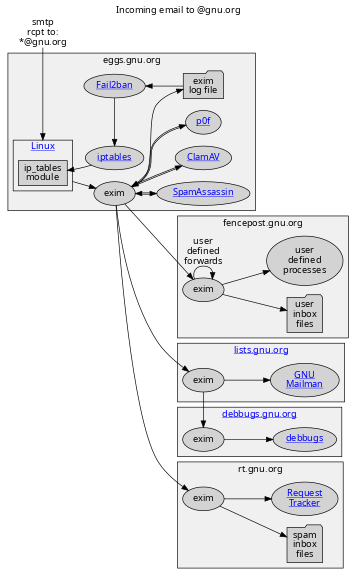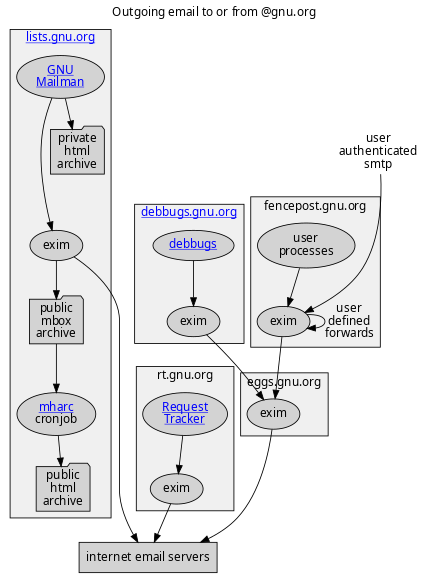| Please consider adding [email protected] to your address book, which will
ensure that our messages reach you and not your spam box.
Read and share online: https://www.fsf.org/blogs/sysadmin/help-the-fsf-tech-team-maintain-email-services-in-freedom
Dear Free Software Supporter,
The Free Software Foundation's (FSF) tech team is a small but
dedicated team of three staff. With your support, and with the
help of volunteers and interns, we run hundreds of services on a
few dozen physical machines in four data centers.
We are very excited about some of the initiatives we are working
on, like deploying our upcoming forge site and other new systems,
expanding our physical server deployments, and a further refresh
of fsf.org. In parallel, the tech team is always working to
better maintain, understand, and document our existing
systems. Mastering those keeps vital systems running smoothly and
lays the groundwork for future improvements.
Email is a key service we provide. Besides it being one of the FSF
campaigns and licensing teams' most important ways of
communicating, we also support thousands of mailing lists for
other free software projects, which send millions of emails per
year. Free software is extremely capable in all aspects of email,
and there continue to be innovative advancements in free software
email programs that we are excited to explore and adopt.
Email in freedom
Email is designed to be federated by domain. If you use someone
else's domain for email, you have to use their server. Whoever
controls a domain's email server can see everything that's in any
email sent through it. You can take measures to defend yourself
by keeping your email private by encrypting
it. We maintain the Email Self-Defense Guide to show you how to do that.
As a communication service, an email server does not take away
your freedom like Service as a Software Substitute (SaaSS)
does. However, a service could come with a condition that makes
you run nonfree software. This is why we, together with
volunteers, maintain a page about Webmail Systems that can
be used in freedom. In the end, running your own email server
for your own domain gives you the maximum amount of freedom and
control over your email. The next best thing is to use an email
server run using free software by an organization or group of
friends you trust.
At the heart of the FSF's email servers is a mail transfer agent called
Exim. One of Exim's key functions is to send email to and
receive email from other email servers on the Internet. Exim is
licensed under the GNU GPL version 2 or any later version. Over
many years, the Exim project has done a wonderful job of
advancing its capabilities and maintaining superb
documentation. The email domains the FSF tech team spends
the most time administering are fsf.org, gnu.org,
nongnu.org, and libreplanet.org.
We recently finished auditing and updating all of our Exim
configurations. The previous configurations had grown out of fifteen years of
small changes into an unwieldy behemoth! By refactoring and integrating
with the Debian Exim configuration, we were able to reduce the
complexity by thousands of lines and organize it into a much more
manageable system. We use the Debian Exim configuration as distributed
through Trisquel, an FSF-endorsed operating system.
The road your email travels
Whenever you send email to an address ending in @gnu.org, the
email server you are sending through looks up the Mail
Exchange (MX) DNS record for gnu.org and finds eggs.gnu.org. You
can test this on a GNU system by running host -t mx gnu.org on
the command line. That is the beginning of the journey of an
email to @gnu.org.

The email is first evaluated to ensure it is valid and not obviously
spam, then is distributed to destinations like the fencepost server, Mailman lists,
debuggs, or RT (also underlined in the graphs as hyperlinks). Two
hosts that may need some explaining are rt.gnu.org and
fencepost.gnu.org. RT runs Request Tracker, a ticket-tracking
system that we host and run for FSF staff, GNU webmasters, and translators to
receive email and manage tasks. Fencepost is a general shell and email
server primarily for GNU maintainers and contributors.
This is not the end of the road your email travels. For example,
an incoming email that goes to GNU Mailman often becomes many
outgoing emails to the list subscribers.

Almost all Mailman mailing lists are configured so that when a
message arrives from an address the list hasn't seen before, it is held for
review by listhelper system which scans it with
SpamAssassin, bogofilter and CRM114 and is
often manually reviewed by a few dedicated volunteers.
Help the FSF tech team's continued development of our free software systems
We hope that our free software—driven approach to email can serve
as an example for individuals and organizations to run their own
email servers for their own domains.
In the next year, we plan to improve the email services we
provide to free software projects by evaluating and hopefully
deploying some new programs such as GNU Mailman 3,
public-inbox, and Sourcehut.
Can you join this effort as an FSF associate member? You can start for as little as $10 per month ($5 for students), or $120 per year. Besides enabling important work at a time the world desperately needs it, your membership enables the FSF tech team to continue making technological improvements that benefit the FSF and the entire free software movement. No other organization stands for free software like the FSF does.
The more members we can count, the better we can defend everyone's freedoms against the largest companies and governments on the planet, and this starts with achieving our fall goal of 500 new members before December 31. Plus, associate members can select a special gift during this fundraiser, and enjoy all the member benefits, which include merchandise discounts, a 16GB bootable membership card, and use of our videoconferencing server.
In my fifth year as part of the FSF tech team, I'm amazed at the
foundation of knowledge our team has gained and I'm extremely excited to
put it to use making more improvements, deploying new systems, and retiring
old ones. For all this work, we depend on the continuous commitment of
volunteers and donors. Please lend a hand and join us in spreading
freedom.
In solidarity,
Ian Kelling
Senior Systems Administrator, FSF
Graphs by Ian Kelling. Copyright © 2021, Free Software Foundation, Inc. Licensed under Creative Commons Attribution 4.0 International license.
The graphs were generated using dot from graphviz. We've made
the source files available for the graphs on incoming email and
outgoing email. |